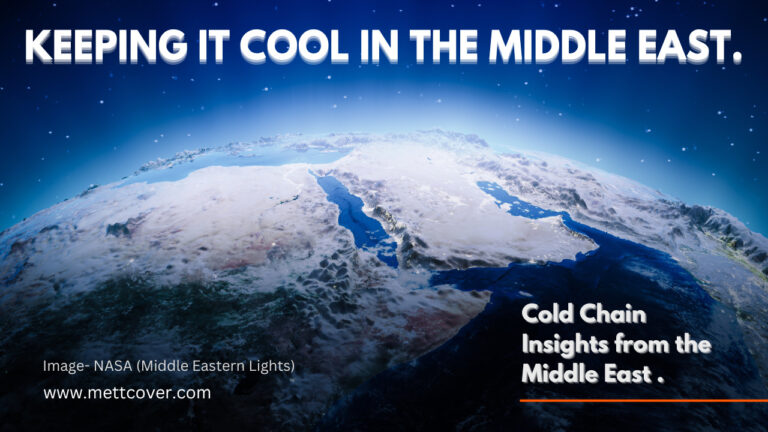Keeping It Cool In The Middle East
- Shivam Mehta
- May 25, 2023

Author – Shivam Mehta COO, Mettcover Global
Greetings Folks! . Since you are here, I am assuming that like me, you are a cold chain enthusiast too. I will try not to disappoint you. This blog is an attempt to share many take-aways from my month-long business trip and I can safely say that cold chain industry in Middle East is transforming at a warp speed. Second only to the dazzling Dubai skyline, Middle East’s cold chain sector growth is a trailblazer in its own right.
Very recently, I got the much-awaited opportunity to visit Mettcover’s partners and clients in the Middle East and North Africa (MENA) region. The month-long trip gave me the privilege of meeting top executives from the cold chain, pharmaceuticals, and aviation sectors. My middle-east sojourn began in the UAE, but the indelible highlight of the trip was witnessing the industry growth in Saudi Arabia and how both powerhouses are leveraging capital and innovation, to harness the global impetus on the cold chain sector.
The Middle East has historically been a focal point for international trade, driving economic growth across the region and acting as a catalyst for diversification into new markets. This trend has continued in current times, with many global companies creating distribution and logistics hubs in the region to capitalise on its strategic position between Asia, Africa, and Europe. However, the Middle East is not without risk, and with geographical proximity to sanctioned jurisdictions and historical trading relationships going back centuries, supply chain participants have had to navigate an increasing range of environmental, legal, regulatory, and geo-political risks as part and parcel of conducting business.
In the rapidly growing global market, the Middle East and North Africa (MENA) region has emerged as a significant player in various industries, including the cold chain sector. The cold chain industry in the MENA has experienced significant expansion in recent years. A colleague in Dubai made me privy to the “Market Data Forecast 2023 Report,” which has pegged the Cold Chain Industry size of the region at about $35 Billion by 2025. This growth can be attributed to factors such as increasing investments in infrastructure, rising consumer demand for quality products, and the region’s strategic location as a trade hub between Asia, Europe, and Africa.
I was amazed at how brilliantly our clients are leveraging Cold Chain Packaging Solutions to save costs and ensure that temperature-sensitive shipments are kept safe and secure throughout their transit, even to remote locations. The region’s scorching temperatures pose formidable hurdles to maintaining temperature control during transit. I was ecstatic and equally proud to learn that, in the United Arab Emirates, a renowned logistics company, is using Mettcover Thermal Pallet Covers to transport frozen perishables while posting zero spillages. By utilizing our thermal covers, they successfully shielded the cargo from extreme heat, preserving its quality and extending its shelf life. This case study highlights the resilience of cost-effective thermal covers in battling extreme weather conditions and underscores their vital role in the Middle East’s cold chain industry.
Another case in point was a major pharmaceutical company in UAE, entrusted to make critical vaccines available through the GCC & MENA regions. In my very first meeting with the company’s purchase manager, he was quick to highlight the fact that a mere 2% increase in pallet load temperature can decrease vaccine potency by 20%. He further added, “These are scientific facts published by WHO, and failure to comply will lead to significant losses.” The gentleman admitted that at first, he was skeptical of using Mettcover MET Q Super Grade thermal covers even though the Lab performance reports were more than satisfactory, but now his apprehensions have vanished. In the past two years of using our thermal covers, the company has saved $150,000 worth of products by almost nullifying the spillage in their cold chain network that, includes even some sub-Saharan regions.
Further in my itinerary, I got to experience the brilliance of the Aviation sector players. Companies like Etihad with their Pharma-life initiative is a case study on its own of managing super human compliance routines and ensuring 100% safety of their cold cargo in international transit. I was thrilled to see many major airlines using Mettcover ULD Thermal covers as a dedicated solution to combat temperature excursions. In line with global regulations, Middle Eastern airlines adhere to stringent international standards for the transportation of temperature-sensitive cargo. These standards include the International Air Transport Association’s (IATA) Perishable Cargo Regulations (PCR) and the Good Distribution Practice (GDP) guidelines for temperature sensitive pharmaceutical products. By complying with these regulations, the aviation industry is enhancing the safety and quality of temperature-sensitive shipments.
In the Middle East, several prominent players have emerged as key contributors to the region’s thriving cold chain sector. Companies such as DHL, DSV, Aramex, Schnecker, Al Naghi, and Barloworld Logistics have made significant strides in offering comprehensive cold chain solutions, leveraging their extensive networks and expertise in temperature-controlled logistics. These industry leaders have embraced cutting-edge technologies, stringent quality standards, and strategic partnerships to meet the growing demand for efficient cold chain services.
When it comes to the country-wise traffic of cold chain shipments, the Middle East paints a fascinating picture. The United Arab Emirates (UAE) and The Kingdom of Saudi Arabia (KSA) stand out as a major hub, with their strategic location serving as a gateway between Asia, Europe, and Africa. Dubai and Jeddah, in particular, have witnessed substantial growth in cold chain activities, catering to diverse industries such as pharmaceuticals, fresh produce, and seafood.
I learned that the region boasts bustling trade routes and strategic locations that facilitate the seamless movement of temperature-sensitive goods. Some of the busiest routes in the region include:
1. UAE-Saudi Arabia Route: The United Arab Emirates and Saudi Arabia form a crucial trade corridor, with a significant volume of cold chain shipments moving between these two economic powerhouses. The UAE’s strategic location, state-of-the-art infrastructure, and robust logistics capabilities make it an ideal hub for handling and distributing temperature-
sensitive products.
2. Qatar-Bahrain Route: The proximity and strong trade ties between Qatar and Bahrain contribute to a substantial flow of cold chain shipments. The growing demand for high- quality perishable goods and pharmaceuticals in both countries have fuelled the need for efficient cold chain logistics, making this route a key artery for temperature-controlled
transportation.
3. Oman-Iran Route: Oman’s strategic location on the south-eastern coast of the Arabian Peninsula serves as a gateway to Iran, creating a vital cold chain route. The movement of pharmaceuticals, perishable goods, and other temperature-sensitive products between these two countries underscore the significance of this route in maintaining the supply
chain integrity.
Rapid advancements in technology, infrastructure, and industry collaboration are revolutionizing the way goods are transported and stored. With a growing focus on sustainable practices, stakeholders are embracing environmentally friendly solutions. Passive cold chain products such as thermal covers, air cargo covers, and container liners have gained prominence for their ability to maintain temperature stability during transit. Temperature monitoring devices like data loggers have become indispensable tools for ensuring product integrity and compliance with stringent quality standards.
Sustainability is a key focus area for the Middle East’s cold chain industry. Stakeholders are actively adopting environmentally friendly practices to reduce energy consumption, carbon emissions, and food waste. Passive cold chain solutions, including thermal covers, air cargo covers, and container liners, are gaining popularity due to their ability to provide insulation and temperature stability without relying on active cooling. These solutions not only minimize environmental impact but also offer cost savings and enhanced product protection.
The industry’s growth in the Middle East is also fueled by collaboration and partnerships among stakeholders. Cold chain providers are joining forces with logistics companies, technology providers, and regulatory bodies to streamline processes, improve efficiency, and ensure compliance with international standards. These partnerships foster innovation, knowledge exchange, and the development of industry-specific best practices.
Beyond food, the pharmaceutical cold chain segment is also witnessing significant growth in the Middle East. With the region’s expanding healthcare industry and rising demand for temperature-sensitive medications, there is a growing need for reliable and compliant cold chain solutions. Pharmaceutical companies and logistics providers are investing in specialized infrastructure, robust quality management systems, and cold chain expertise to meet the increasing demand for safe and effective drug distribution.
As the curtain drew on my exploration of Arabian Delights, I was certain of one thing; the cold chain industry in the region is marching faster than the proverbial ‘sultanate’ and the industry, while it is already rivaling the volumes of Europe, it is not far behind the USA.




